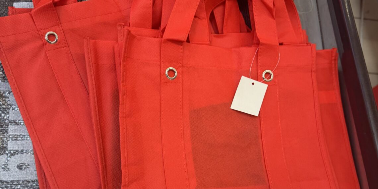…Tokunbo Wahab: Sustained Efforts Critical in Phasing Out Single-Use Plastics

Shoppers at ShopRite supermarkets across Lagos State are encountering a notable shift in their shopping experience this January 2025, as the retail giant has ceased providing nylon bags for groceries. In compliance with Lagos State’s ban on single-use plastics (SUPs), customers are now encouraged to either purchase reusable shopping bags for N500 or bring their own bags from home.
The transition was highlighted by Lagos shopper @Bisolaa, who shared on X, “ShopRite no longer offers nylon bags for your groceries based on Lagos State ban on single-use plastics.” This development reflects the government’s broader strategy to tackle environmental pollution and reduce plastic waste.
SUP Ban Takes Full Effect in Lagos
The ban on single-use plastics, first announced by the Lagos State Government in January 2024, aims to address the environmental hazards caused by plastics and styrofoam. These materials are known to clog drainage systems, litter streets and markets, and pose significant health risks.
The ban is backed by legal frameworks, including the National Environmental (Sanitation and Waste Control) Regulation 2009 and the 2017 State Environmental Management Protection Law. Despite initial enforcement actions by agencies such as the Lagos State Waste Management Authority (LAWMA) and the Kick Against Indiscipline (KAI) task force, compliance was uneven, leading to a final government warning in October 2024. The full enforcement of the ban officially commenced in January 2025.
Mixed Compliance Among Retailers
While ShopRite has fully embraced the ban by eliminating nylon bags, checks by our correspondent reveal that some other supermarket chains are still providing plastic bags, suggesting varying levels of compliance across the retail sector.
The Lagos State Government has been actively working with private sector organizations to develop and promote alternatives to single-use plastics. This includes exploring innovative solutions for packaging and waste management, with a focus on reducing the environmental footprint of everyday consumer products.
Government’s Commitment to Sustainability
Commissioner for Environment and Water Resources, Tokunbo Wahab, has consistently highlighted the progress made since the initial ban. He has noted a significant reduction in styrofoam litter and emphasized that ongoing enforcement efforts are crucial for maintaining these environmental gains.
“The efforts to phase out single-use plastics are part of our commitment to a cleaner, healthier Lagos. This ban is not just about compliance but about ensuring a sustainable future for our residents,” Wahab stated.
The transition away from single-use plastics represents a critical step in Lagos State’s environmental policy, aiming to create a more sustainable and eco-friendly urban environment. The government’s collaboration with businesses and the public in promoting reusable alternatives is expected to play a key role in achieving long-term environmental goals.